- Home
- Taylor Caldwell
I, Judas Page 7
I, Judas Read online
Page 7
The Sadducees and Pharisees had pressed into the front rows, and from their expressions they were preparing to challenge the Baptist. There was a smugness about these Temple birds that I found sickening. One rabbi, whose hauteur pronounced him a Sadducee, perched himself squarely in front. The Essenes moved swiftly to displace him, but a wave of the Baptist’s hand restrained them.
“Let the Sadducee speak,” he said with a gleam in his eyes. “I have no need to see his badge to know who sent him.”
The Sadducee, a small, dark man with a crooked back, gazed blandly at the Baptist.
“You speak with such authority,” said he in silken tones. “Are you then the Promised One, the Messias of Israel?”
“I have already spoken of him who comes to deliver us from evil. Stay and meet him as well.”
My ears perked up.
“And when does he come?” In my eagerness, I forgot my anonymity.
He gave me a keen, searching look. “You will know him when he comes and he will know you.”
A tingle went up my spine.
The Sadducee’s mullet eyes tarried with me a moment, then returned to the Baptist.
“You are right, sir, in calling me a Sadducee. My name is Sadoc, of the same family who founded our party and kept the code of Moses alive in the Babylonian Captivity.”
The Baptist seemed to enjoy the colloquy. “And now you sit, like your fathers, in the Great Sanhedrin and pass judgment on the Promised One.”
Sadoc, to give him his due, did not appear daunted.
“You say well to disavow yourself as the Messias. For all know that a son born to man cannot be the Anointed. It is well known that you are the son of the Pharisee Zacharias and of Elizabeth, Judeans both, and so of the twelve tribes.”
A murmur rose among the Essenes, to quickly subside at a look from the Baptist.
“The Sadducee,” he said, “does me honor to know my lineage.”
A brawny giant who had assisted the Baptist at the river rose to his full stature and roared his disapproval.
“You, Master, are the prophet Elijah, returned to lead Israel to freedom.”
The Baptist shook his head. “As I have said, I am the forerunner, the voice of one crying in the wilderness, to make straight the way of the Lord.”
Ahiram the Giant, meaning a brother of height, was not so easily turned away. With a scornful glance for the twisted little Sadducee, he quickly interposed: “But, Master, all know that you were born to Elizabeth long after it is given to women to bear children. So surely, as of old, it was God’s gift, and for this reason you were called Jochanan or John, the God-given?”
The Essenes clapped their hands in a wild chorus of approval, but the Baptist only smiled indulgently, as if at so many children. Sadoc’s face had set in grim lines. He had the look of the Inquisitor about him. I feared him even more than the scheming Annas, for his humped back was a yetzahara, an affliction from birth, and could well have filled him with hate, prompting him to prove himself superior to the normal man. A yetzahara had put the devil in more than one man.
I knew Sadoc by repute. He was considered second only to Annas in wiliness and guile, a true son of the rival Boetus hierarchy, which traditionally made the Temple its private preserve.
He spoke now with elaborate courtesy, as the serpent may have addressed the rabbit he was contemplating for supper.
“And may I ask when we can expect this dignitary greater than you?”
The Baptist had taken Sadoc’s measure.
“Stay and see, O messenger of the All-Highest, and perhaps it will be sooner than you think.”
“A prophet should have no trouble foretelling this event.”
The Baptist suddenly lost patience with this game of cat and mouse.
“Is it a healing of body or mind that you seek. Master Sadoc?”
Sadoc’s calm left him, and his voice trembled in suppressed fury.
“I see your future, prophet, better than you do mine.”
There was a hush now, and the Essenes edged closer to the bristling Sadoc, only to be stayed again by the Baptist.
“I know my future, Sadoc, as I know the future of Israel. Sing no sad songs for me, for I walk with the Lord and fear no evil.”
His voice rose powerfully, singing out triumphantly, as he made a hymn of the words of the prophet Isaiah.
“We ask where he is,” he trumpeted to the sky, “and Isaiah has told us where to look, if we have eyes to see and ears to hear, and a heart to feel.”
“‘For unto us,’ said he, ‘a child is born, unto us a son is given, and the government shall be upon his shoulder, and his name shall be called Wonderful, Counselor, the mighty God, the everlasting Father, the Prince of Peace.’”
How many times had I thrilled over these words and prayed the prophecy would be fulfilled in my lifetime? How many times had I tried to picture him as I studied the Prophets? My heart rejoiced now with the realization that a prophet as great as Isaiah was heralding the glorification of Israel. It had never before seemed so imminent.
“And there shall come forth a rod out of the stem of Jesse, and a branch shall grow out of his roots.” And the spirit of the Lord would rest upon him, the spirit of wisdom and understanding. He would be a true leader, no mealy-mouthed merchant of platitudes, counseling patience in the face of oppression. And as a true son of David, for a slingshot he would carry a sword.
“With righteousness,” the Baptist went on, “shall he judge the poor, and reprove with equity for the meek of the earth: and he shall smite the earth with the rod of his mouth, and with the breath of his lips shall he slay the wicked.”
Only a few in the crowd seemed displeased. “No, no,” they shouted, “it is you. Master. You are the Promised One who shall free us from the oppressor.”
He shook his head.
“I speak of another, far greater than I, whose shoes I am not fit to tie. I am of this earth, he of the Kingdom of Heaven.”
The protests grew stronger. “Say not so, for you heal the ailing with a touch of the hand and drive the devil out of the deranged with soft-spoken words. Who else could do as much?”
I liked his fierceness. Yet when he spoke of the Lamb of God his voice became gentle and his eyes softened.
The Lamb of God offered hope. The tithes to the Temple would be abolished, as would the dietary laws governing impure and pure food. Unfair taxes would be eliminated. The nation would be restored. And the Romans had better look to their laurels. For had not the psalmist promised:
“He will break his enemies with a rod of iron and dash them in pieces like a potter’s vessel.”
Always in prophecy he was called a “rod” or “branch” from the Hebrew nazar. Perhaps there was a clue here, to be revealed with his coming. Jeremiah said the branch was out of David; Zechariah, more specifically, that his name would be the branch. Would that I had the Baptist’s trust in these prophecies, for, however boldly I spoke, I had some misgivings at times.
At these prophecies, the Baptist’s face glowed with an inner light. So might he have looked when he saw the face of the Lord.
“He shall feed his flock like a shepherd. He shall gather the lambs with his arm, and carry them in his bosom, and shall gently lead those that are with young.”
John had the mettle of a great leader, but he was obviously not assertive enough for the militant. I sensed this in the attitude of some whom I knew as Zealots. Indeed, looking about just then, I noticed the apparent inseparables Cestus and Dysmas standing stony-faced next to some Essenes who had raised aloft a banner with the sign of the fish. I knew enough of astrology to know this betokened the new Piscean Age, ending the Arian Age, which was symbolized by the ram’s horn and its call to sacred worship. Had not Isaiah warned against this mischievous quackery of the Babylonian soothsayers? The zodiac suited Babylon or Rome better than it did a prophet of Israel.
The two Zealots had a question for the Baptist. And he apparently divined as much, for he turned
to them with a nod.
Cestus’ curiosity took the same lines as my own.
“This Messiah you speak of, will he gain Israel freedom from Rome?”
The Baptist smiled enigmatically. “He will liberate us from every tyranny, including the tyranny of death.”
This was not quite what a Zealot wanted to hear.
“How can there be no death?” said Cestus, with a faint smile of disbelief.
Obviously the Baptist had evaded the question.
“We speak of Rome,” said Cestus, “not some vague, indefinable tyrant hidden in the clouds.”
“All will make obeisance to him who comes,” the Baptist said mildly, “and none shall bow lower than Rome.”
An air of excitement raced through the crowd, for the Baptist spoke with a quiet conviction more impressive than any oratory.
I saw the surly Sadoc busily taking notes and, to my surprise, the publican Levi scribbling on a scroll.
Sadoc’s eyes held a malicious gleam. “Rome will be pleased to note that one man will manage its overthrow.”
“That, Sadoc, was not what I said. You would do well to listen.”
As the two Zealots melted into the crowd, I realized that in the great multitude fanning out from the riverbank there was a cross section of Israel.
I stood near John, watching the faces in the crowd, and I saw the untrimmed beards and the striped blue shawls of three Pharisees who stared at the Baptist with hard, unyielding eyes. The foremost of the three was a Pestle Pharisee. In his unctuous piety he appeared to lean forward like a pestle in a mortar.
“Rabbi,” said he, using the common term for teacher, “tell us how you know of this man who comes.”
A smile illuminated the Baptist’s face.
“In the mountains of Moab I had a vision. In this vision I saw an angel of the Lord, and he proclaimed in a voice such as I had never heard before the fulfillment of the prophecy so disturbing to our elders in the past. ‘I the Lord have called thee in righteousness, and will hold thine hand, and will keep thee, and give thee for a covenant of the people, for a light of the Gentiles.’”
The Pharisee’s eyes clouded with wrath.
“What has our Messiah to do with the Gentiles?”
The Baptist’s voice was faintly mocking. “You do not accept the Promised One, and yet you challenge the conditions of his coming?”
He closed his eyes. “Is your name not Eleazar, and do you not sit in the Sanhedrin?”
The Pharisee appeared stunned, but he quickly recovered.
“I have been pointed out to you. My father, Nathan, was associated with your father in the Temple.”
The Baptist’s eyes remained closed. “I never saw you until today, and I shall never see you after you leave here, but the Lord God will mark what you do one day. You and your brethren.”
Eleazar looked about uneasily, then said with a show of assurance, “No new prophets arise in Israel.”
“One greater even than Moses shall come, and you will know him not.”
Eleazar fell back on a crabbed interpretation of the law. “It is forbidden the sons of Abraham to hold familiar intercourse with the Gentiles.”
The Baptist slowly opened his eyes. “Why,” he said, “do you keep this news from the High Priests, who dally every day with Rome?”
Although the thought of a Messiah to the Gentiles appeared preposterous, I joined in the general laughter. Eleazar, however, was not easily put off.
“Then this Messiah you speak of would dissolve God’s covenant of exclusivity with the Chosen of Israel and consider the Romans with the same favor as he would his own people?”
John saw the trap. “I had a vision,” he repeated with a touch of irony, “in which an angel mentioned the sacred words of Isaiah, describing as a light to the Gentiles the one yet to come. Do you question the prophet all Pharisees profess to adore?”
As a new gale of laughter swept the assembly, the Pharisee darted a murderous look at the Baptist. “You speak as if the angel were addressing his message to you.”
John shook his head slowly. “Listen well, for I am indeed the voice of him that cries in the wilderness, to make straight in the desert a highway for our Deliverer.”
The Pharisee’s face reddened.
“And when, pray,” said he in a rasping voice, “can we count this Messiah in our midst?”
“Look and you shall see. Listen and you shall hear. He shall be everywhere. O Zion, that brings good tidings. Get thee up into the high mountains. O Jerusalem, that brings good tidings, lift up your voice with strength. Lift it up, be not afraid, say unto the cities of Judah, behold your God.”
The Zealots had listened impatiently.
“The Hammerer taught Israel that God listens to those who fight for what they hold dear.”
“And what, Dysmas, do you consider dear?”
Again, the uncanny use of a name confounded the individual.
“How do you call me thus? You have never seen me before.”
For the first time there was a hint of compassion in the Baptist’s smile. “I have seen you many times,” he said softly, “would that I hadn’t.”
“You seek to intimidate me.”
“On the contrary, I find you blessed for the way you shall one day enter the Kingdom of God.”
Dysmas sputtered for a moment, then fell silent and looked about uneasily. Could this be a premonition?
There was a compelling openness about John. He was an Essene but not a captive to that philosophy, though he lived, monklike, in the Essene tradition of neither mating nor procreating. But he was sophisticated enough to know that not all could be Essenes or in time there would be nobody to preach to and nobody to save.
It had been a long day, and the Baptist had promised an early start in the morning. And so as the multitude went off to their camps I found myself wondering what I could report to the High Priests that Sadoc and Eleazar would not already tell them. But at least I was at the hub of things, and could fan out from there, exploring the popular mood, a prime factor in any revolution. In this wise I hastened to my appointment with Adam the Tanner and the Amharetzin, thinking to find out how they had reacted to the Baptist and his promise of another.
They were sitting in a small circle, about a dozen of them, their rough faces even rougher in the shadowy light of the campfire. The tanner rose to greet me, making a low bow so exaggerated that I regarded him suspiciously. Was this clod making fun of his betters?
He called off the names around the circle, and each nodded blankly: Simon, Noah, David, Solomon, Abraham, Isaac, Jacob, Joseph, and so forth, great names for garbage collectors, draymen, and the like. But without such as these, there could be no rebellion and no freedom. It was important, since there were so many of them, that our cause become theirs, for the Zealots were a leadership corps, an officer bank, nothing more. Strong arms and backs were needed.
I preferred to stand and look down at them, feeling a certain advantage in this stance. My eyes surveyed the circle slowly, then returned to Adam the Tanner, who was doing his best to look intelligent. I saw no point in beating around the bush. They were either with us, or not. Still, it did no harm to flatter them.
“I am pleased,” I said, “by the many Amharetzin I have seen here. I did not know the plain people were so religious.”
For some obscure reason, my remarks touched off a ripple of laughter.
“They mean no offense,” said Adam, “but it is not religion they seek.”
“Why else would they visit the Baptist?”
“We came for a Messiah, but he says we came for nothing.”
“Then why do you stay? Knock out your fire and leave, it will go on without you.”
“Because there is still hope for the morrow. And that is all we Amharetzin have. We do not have the fine homes of the aristocracy and the Romans, the lavish foods and wines, the alluring women whom only wealth can provide. We live in simple hovels, and we see nothing better in sight. For
the freedom you speak of does not mean the same thing to us. It matters little whether the Sanhedrin or the Fortress Antonia rules, for our lot will be the same. But with the Messiah there will be a new day, for do not the Prophets say that he comes to help the oppressed and the meek?”
I could hardly restrain a smile. Meek indeed. He gave himself more airs than the High Priests.
“But you have no feeling that the Messiah is a religious leader, so how will he help you?”
“Not in the religion of the Temple, but he will still be of God. For without God he is not the Messiah and would be no more powerful than others who came with fine promises and brought only ruin to their followers.”
There had been so many false prophets that it would have been idle to ask whom he meant.
“So if it is not freedom you seek, what is it you want?” A very wise man, I think it was Gamaliel, had once told me that he judged people not by what they said or even did, but by what they wanted.
Adam looked morosely over his company of clods. And then, suddenly, his eyes flashed. “We want freedom from fear,” he cried. “We want to know there is some purpose to these miserable lives we lead, and that when we die, having not truly lived, we do not step off the brink of some precipice into a bottomless abyss of unknown terror.”
I was momentarily taken aback, for how did a lout like this come by these thoughts?
He read my surprise correctly. “We, too, are people, sir, who have the same secret cravings for assurance as the rich and the mighty.”
“Is it not enough,” I said, “to know the God of Israel watches over the children of the covenant?”
This statement, for some reason, inspired another ripple of laughter. The woodcutter, Solomon, a sly rogue with a single yellow fang, gave a malevolent chuckle. “He may watch over you, sir, but we are not so sure about the likes of us.”
“His eye marks the fall of the smallest sparrow,”
There was a gust of laughter, and two or three of the clods doubled over in merriment.
“Sparrows,” cried Solomon, “have fine feathers compared to us. The aristocrats, I suppose, are peacocks.”
I looked at him in disgust.

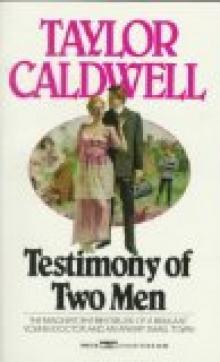 Testimony of Two Men
Testimony of Two Men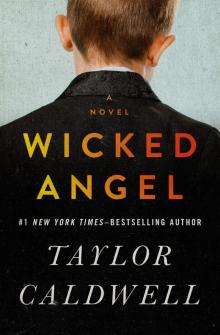 Wicked Angel
Wicked Angel The Arm and the Darkness
The Arm and the Darkness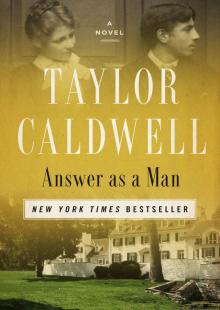 Answer as a Man
Answer as a Man Grandmother and the Priests
Grandmother and the Priests On Growing Up Tough: An Irreverent Memoir
On Growing Up Tough: An Irreverent Memoir Ceremony of the Innocent
Ceremony of the Innocent The Listener
The Listener Bright Flows the River
Bright Flows the River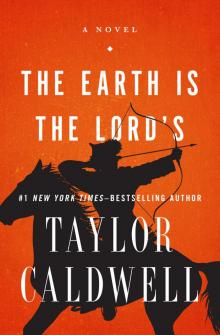 The Earth Is the Lord's
The Earth Is the Lord's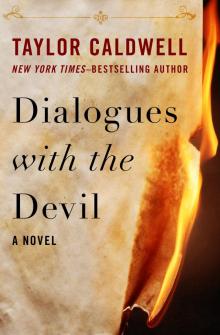 Dialogues With the Devil
Dialogues With the Devil A Tender Victory
A Tender Victory This Side of Innocence
This Side of Innocence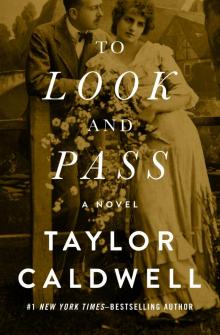 To Look and Pass
To Look and Pass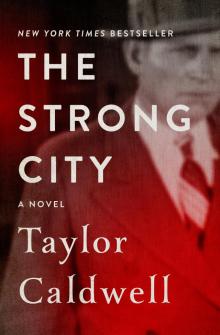 The Strong City
The Strong City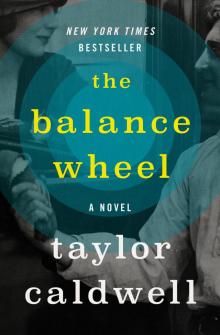 Balance Wheel
Balance Wheel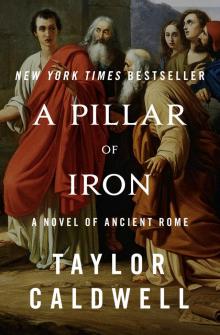 A Pillar of Iron: A Novel of Ancient Rome
A Pillar of Iron: A Novel of Ancient Rome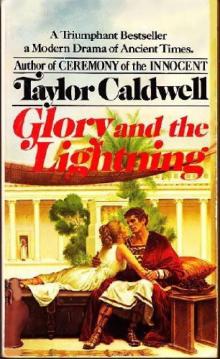 Glory and the Lightning
Glory and the Lightning Dear and Glorious Physician
Dear and Glorious Physician The Wide House
The Wide House The Final Hour
The Final Hour Never Victorious, Never Defeated
Never Victorious, Never Defeated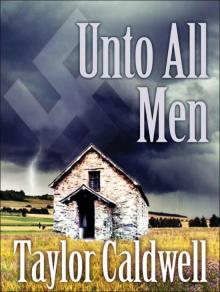 Unto All Men
Unto All Men The Turnbulls
The Turnbulls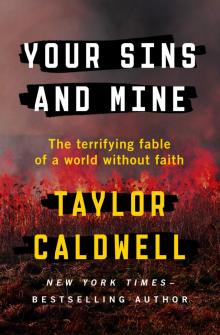 Your Sins and Mine: The Terrifying Fable of a World Without Faith
Your Sins and Mine: The Terrifying Fable of a World Without Faith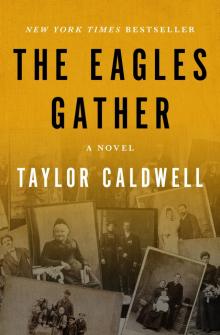 The Eagles Gather
The Eagles Gather Let Love Come Last
Let Love Come Last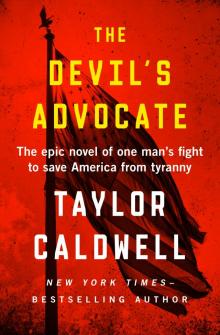 The Devil's Advocate: The Epic Novel of One Man's Fight to Save America From Tyranny
The Devil's Advocate: The Epic Novel of One Man's Fight to Save America From Tyranny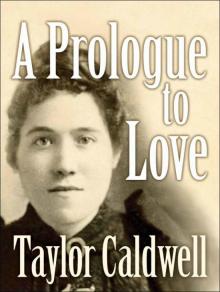 A Prologue to Love
A Prologue to Love Maggie: Her Marriage
Maggie: Her Marriage The Late Clara Beame
The Late Clara Beame Melissa
Melissa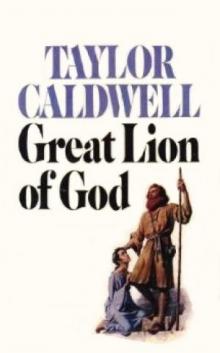 Great Lion of God
Great Lion of God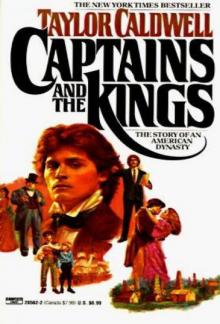 Captains and the Kings
Captains and the Kings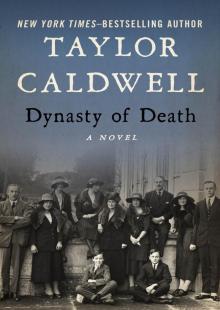 Dynasty of Death
Dynasty of Death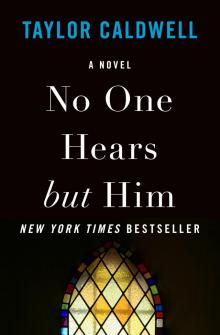 No One Hears but Him
No One Hears but Him The Sound of Thunder
The Sound of Thunder There Was a Time
There Was a Time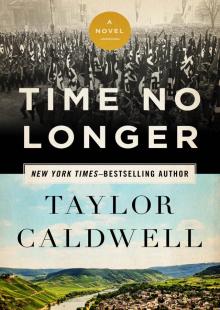 Time No Longer
Time No Longer I, Judas
I, Judas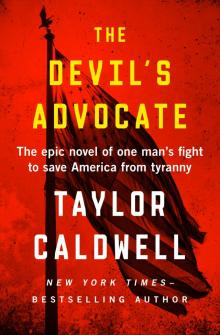 The Devil's Advocate
The Devil's Advocate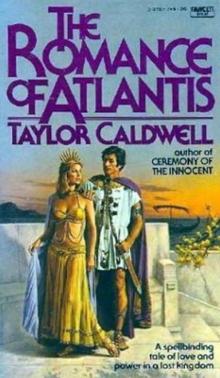 The Romance of Atlantis
The Romance of Atlantis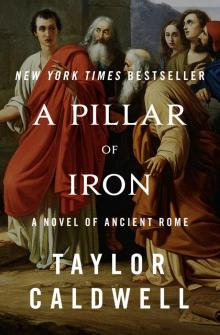 A Pillar of Iron
A Pillar of Iron On Growing Up Tough
On Growing Up Tough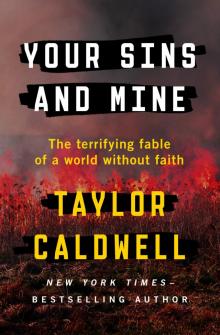 Your Sins and Mine
Your Sins and Mine